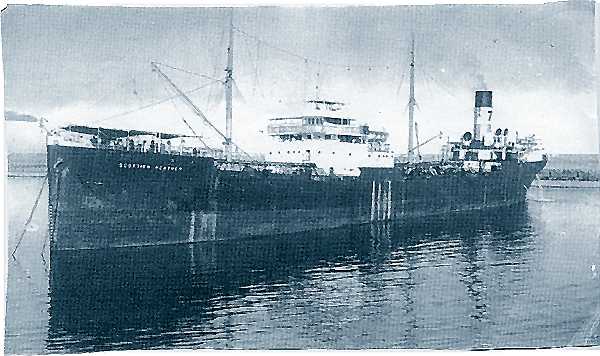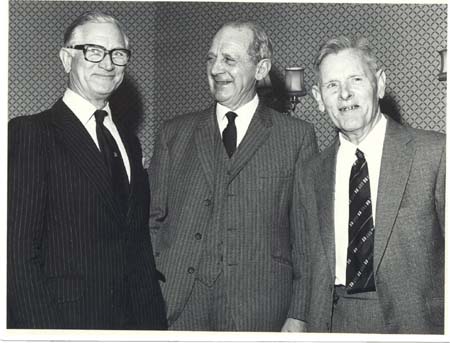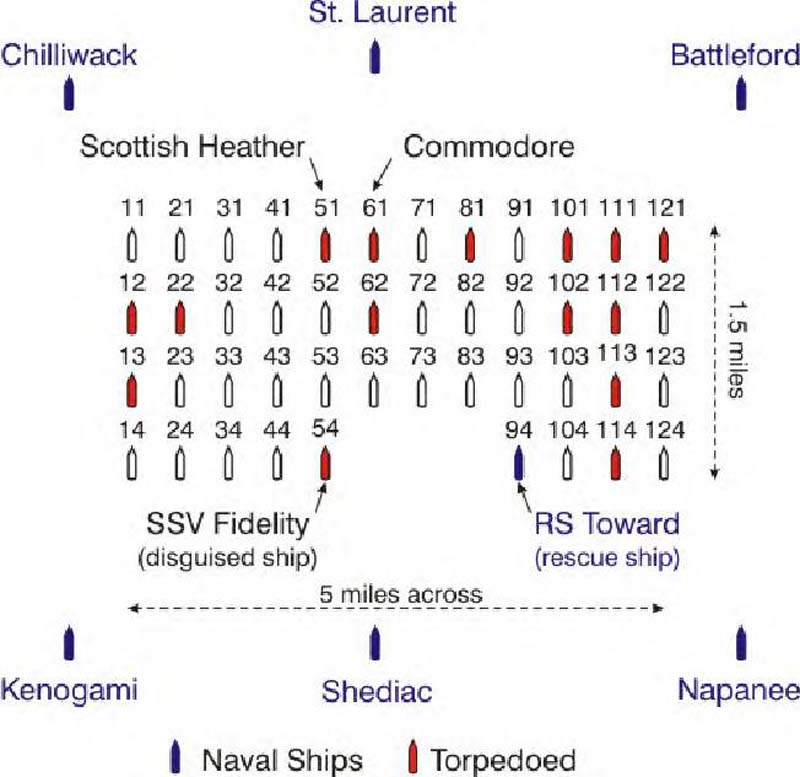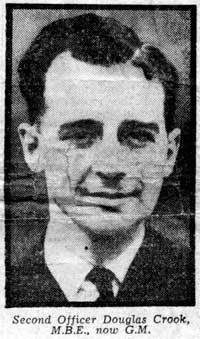Torpedoed in
Convoy ONS154

Skeleton crew stayed and won
At 2135 hrs on 27 December 1942, the Scottish Heather was hit on the starboard side forward of the bridge by one torpedo from U-225, shortly after it had refuelled HMCS Chilliwack (K 131) about 15 miles behind the convoy ONS-154. The corvette had spotted the surfaced U-boat before the attack and
opened fire. The U-boat went on full speed and outmaneouvered the warship on the surface for the successful attack on the tanker. The corvette forced them to dive and dropped depth charges but did no damage to the submarine.
Three boats were lowered
when a ship was torpedoed. The captain and most of his officers were
shattered by the explosion. Second Officer Douglas Crooks, M.B.E., of
Selbourne-grove, Keighley, Yorkshire saw there was a chance of saving
the ship and called for volunteers to stay:- Last night's official
citations name these heroes of the low deck, each of whom receives the
B.E.M. for outstanding bravery and devotion to duty at sea.
1. The cabin boy - Thomas Dillon, aged 17, of Countess avenue,
Whitley Bay, Northumberland, displayed conspicuous gallantry in
remaining on board, although as the youngest member of the crew he
should have gone off in one of the lifeboats.
2. The greaser - Denis Andrew Byrne, Last-street, North Shields
worked all night to get the engines running again.
3. The cook - Ernest Bainbridge, of Park-crescent, North Shields,
came out of his galley, was one of the first to volunteer to stay in the
ship.
4. Ordinary Seaman - James W. Walker of Chirton, West View, North
Shields, tough man of the sea. He has volunteered for several dangerous
trips, would have still been working in the engine-room of his ship had
gone down.
Second Officer Crooks, adds the George Medal to his M.B.E. and
22-year-old, Sixth Engineer Gordon Allan of Harrison-place
Newcastle-on-Tyne, gets the M.B.E. Crooks and his volunteers saved the
ship and picked up the survivors. The ship is now at sea again.
Obituary from Unknown Date
Modest war hero James Walker,
who helped save a crippled ship following a U-Boat attack, has died at
the age of 74. The North Shields sailor was one of 11 men who stayed
aboard a tanker to keep her afloat and rescue the rest of the crew
during World War Two. His actions earned Mr. Walker, of Ponteland Close,
North Shields, the British Empire Medal, but he did not talk about the
episode - and even kept the details from his family.
The story is told in a book,
The Convoy
That Nearly Died, written by West Hartepool sea captain Henry
Revely, who served aboard one of the convoy protection ships. He tells
how the convoy which set out to Canada at Christmas 1945 fell victim to
one of the largest U-Boat attacks of the war, with 45 ships being
attacked by 19 German vessels.
Among the ships was the tanker
Scottish
Heather, based in North Shields, on which Mr. Walker served. The
ship was torpedoed and the crew ordered to abandon her, but 11 men
stayed aboard to salvage the ship.
Footnote: Scottish Heather was renamed Athelcrest in 1951 (United
Molasses) and was broken up, at Blyth, in 1954.

Chief Officer John Flockart, Second
Officer Dougie Crook, and Third Officer Tom Gorst

Convoy ONS 154 order of Procession.
Interesting to note the inclusion of
HMS Fidelity

By a Daily Mail Reporter (circa 1943)
Modesty is the chief characteristic of
Merchant Navy Second Officer Douglas Crook of Keighley, Yorkshire,
who last night added the George Medal to the M.B.E. which he had already
won for gallantry at sea. After staying on board a damaged ship with 10
men and saving it he wrote a report for the Admiralty in which he did
not even mention his own name. But he let himself go in praising the
courage of the men who helped him. The official citation awarding him
the GM, however, says of him: "He displayed great and sustained courage,
and his resource and resolution saved a valuable ship and probably many
lives."
In his report, Second Officer Crook
wrote: "Without the skill, ability, courage, and cheerful conduct of
Sixth Engineer Gerard Gordon Allan, the whole project must have ended in
dismal failure. Sixth Engineer Alan is 22. His home is in Harrison
place, Newcastle-on-Tyne. He has been at sea only a year, but as a
result of Second Officer Crook's report, he has been awarded the M.B.E.
There are British Empire Medals for 17-year-old cabin boy Tom Dillon, of
Countess-avenue, Whitley Bay, a former fishmonger's errand boy and one
of a family of ten; Dennis Andrew Bryne of Last-street, North Shields, a
greaser, who went down into the engine-room with Allan and worked the
ship;
Ernest Bainbridge
ship's cook, of Park-crescent, North Shields; and Seaman
James W. Walker,
of Chirton West View, North Shields.
When the ship was torpedoed, two boats got away with the master, who had
been injured, and most of the officers and crew, but Second Officer
Crook and ten others remained aboard. It was dark. Heavy seas were
running. No lights were allowed. Crook did not even know who had
remained behind with him. He asked if there was an engineer among them.
Allan stepped forward.
"Can we have some steam?" asked Crook. "Better wait until daylight. The
U-boat will pick it up if we run the engines now," replied Allan. He had
already been down in the engine room shut off steam valves , drawn
fires. But by daylight he and Byrne had got steam up again, signalled
they were ready to make way.
In spite of the hole and the terrific seas, the ship held together. They
didn't make straight for port. Second Officer Crook calculated that they
could spend daylight that day looking for the boats. If they weren't
found by dusk they would have to be left. Fog cut down visibility to a
few yards. it looked a hopeless quest. But when Crook asked his crew of
10 if they were willing to take the risks involved they said to a man:
"Sure; carry on."
At noon, the first boat was sighted, and its occupants were taken
aboard. They were in pretty bad shape. At dusk, within 10 minutes of the
end of the search, they found the second boat. Every man was saved.
On the day the ship reached port there sprang up one of the fiercest
Atlantic hurricanes for 50 years. "We made it by the skin of our teeth,"
said Allan. Allan made no official report. He was only sixth
engineer. But to his mother he said: "The real hero was our cook. He
produced hot meals to schedule without turning a hair, and we only knew
what that really meant when we saw the chaps who had been in the boats
all night. They had gone without much in the way of comfort, and told us
that they could not have survived a second night of it."
Epilogue: Sixth Engineer Allan is now Fourth Engineer ... in the same
ship which is at sea again. He and Second Officer Crook are wearing gold
watches presented by the company. Allan's father was first engineer in
the merchantman Clifton Hall, which in the last war fought a U-boat
single-handed for three and a half hours and ended the battle by ramming
and sinking it.
Fate of the U-225. Sunk on 22 Feb 1943 in the
North Atlantic, in position 48.37N, 30.35W, by depth charges from the
British corvette HMS Dianthus (Lt. N. E. Israel RNR). 46 dead (all hands
lost).
Sources & Reference
http://uboat.net/allies/merchants/2538.html
http://www.ubootwaffe.net/ops/ships.cgi?boat=225;nr=1
http://www.gordonmumford.com/m-navy/survive3.htm
http://en.wikipedia.org/wiki/German_submarine_U-225
http://www.uboat.net/boats/u225.htm
|